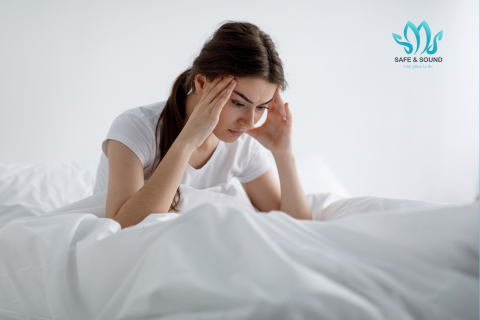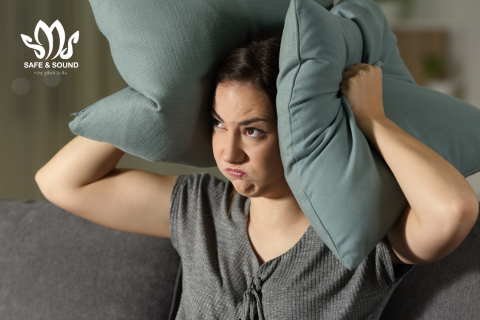Insomnia From Stress: Warning Signs and Treatment Approaches | Safe and Sound
Stress-induced insomnia is one of the common problems that affects the mental and physical health of many people. When the pressure of work, life or personal problems increases, your sleep will become intermittent, difficult to fall asleep or wake up in the middle of the night and cannot fall back asleep. If not treated promptly, this condition can lead to many serious consequences. In this article, a psychologist will help you better understand the warning signs as well as effective treatment directions for stress-induced insomnia.
Phi Thuy Linh | Bachelor of Public Health – Mental Health Care Application Safe and Sound
Institute of Medical Technology Applications
1. What is stress-induced insomnia?

Stress insomnia is a condition of insomnia and difficulty sleeping due to stress.
Stress-induced insomnia is a condition of difficulty falling asleep or staying asleep due to prolonged stress, anxiety, or psychological pressure. When stressed, the sympathetic nervous system is highly active, increasing the levels of cortisol and adrenaline hormones, causing the body to stay awake and making it difficult to relax. This makes it difficult to fall asleep or wake up frequently in the middle of the night.
2. Warning signs of insomnia due to stress
Stress-induced insomnia not only affects sleep but also has a serious impact on physical and mental health. Psychologists often identify this condition through the following signs:
2.1. Difficulty falling asleep
It takes you a long time to fall asleep, even though your body feels tired. Anxious, stressful thoughts keep you awake. Worries about work, finances, family, or other personal issues can keep your mind active at night, leading to persistent insomnia.
2.2. Waking up many times during the night
People with stress-induced insomnia often wake up several times during the night, and their sleep is restless and not continuous. This may be because the nervous system is still active and cannot fully relax. Nightmares or sudden jerks due to stress are also common signs.
2.3. Get up earlier than usual
Even if you haven’t had enough sleep, you wake up too early and can’t get back to sleep. This can leave your body lacking energy and feeling tired all day long. Psychologists say waking up earlier than usual is linked to high levels of anxiety, which prevents your brain from maintaining a restful state.
2.4. Poor sleep
Disrupted sleep prevents your body from reaching deep sleep (REM). As a result, you may get enough sleep but still feel tired and sluggish when you wake up.
2.5. Fatigue, memory loss and poor concentration
Chronic sleep deprivation due to stress reduces your ability to process information, causing loss of concentration and memory loss. You may feel foggy-headed, have difficulty making decisions, or easily forget important tasks.
2.6. Irritability, negative emotions

Prolonged lack of sleep makes you irritable and impatient.
When you lack sleep, you become irritable, impatient, and more sensitive to the things around you. Small stresses can cause you to overreact, affecting your personal and work relationships.
2.7. Headache, muscle tension, digestive disorders
Stress and insomnia can cause physical problems such as headaches, muscle cramps, stomach aches or digestive problems. These are signs that the body is responding to prolonged stress.
If you experience the above signs, psychologists advise that you should find ways to control stress and adjust your sleep promptly to avoid long-term health effects.
3. Treatment for insomnia caused by stress
Treating insomnia caused by stress requires a combination of different methods, from adjusting lifestyle habits to applying relaxation techniques and intensive intervention from a psychologist .
3.1. Change living habits
3.1.1. Maintain a fixed sleep schedule
Try to go to bed and wake up at the same time every day to help your body develop a stable circadian rhythm, which helps your brain recognize when it needs to sleep and when it needs to be awake. When you go to bed and wake up at the same time every day, even on weekends, your body will naturally adjust its biological clock (sleep-wake cycle), helping to improve sleep quality.
Additionally, having a consistent sleep schedule can help reduce stress, as your body doesn’t have to constantly adjust to sleeping late or waking up at irregular times. This reduces the secretion of cortisol (the stress hormone) and increases melatonin (the sleep hormone), making it easier to fall asleep and sleep more deeply.
3.1.2. Limit the use of electronic devices before going to bed
Blue light from phones and computers can suppress melatonin, an important hormone that helps regulate sleep cycles, making it difficult to fall asleep and more likely to disrupt your circadian rhythm. Instead, read a book or listen to soft music to help your body and mind prepare for deeper sleep.
3.2. Relaxation techniques before sleeping
Meditation and deep breathing exercises help calm the nervous system, reduce stress and facilitate sleep. When stressed, the brain often gets caught up in a constant stream of negative or worrying thoughts, making it difficult to relax and fall asleep. Mindfulness meditation helps focus on the present, stop overthinking and regulate emotions. When you practice meditation regularly, your body reduces the production of cortisol (stress hormone) and increases melatonin (sleep hormone), helping to improve sleep quality.
Additionally, when stressed, the sympathetic system becomes overactive, causing the heart to beat faster, breathing to become shallow, and the body to tense up. Deep breathing techniques, such as the 4-7-8 method (inhale for 4 seconds, hold for 7 seconds, exhale for 8 seconds), help activate the parasympathetic system, slowing the heart rate, lowering blood pressure, and putting the body into a state of relaxation, making it easier to fall asleep.
How to do it: Start by lying in a comfortable position, inhale through your nose for 4 seconds, then hold your breath for 7 seconds and finally exhale slowly through your mouth for 8 seconds. Repeat this cycle about 4 times.
3.3. Psychotherapy
If insomnia persists and seriously affects your life, you should consult a psychologist. Some effective psychological therapies include:
3.3.1. Cognitive behavioral therapy (CBT-I)
This is a common treatment that helps change bad sleep habits and control negative thoughts that cause stress. A psychologist will start by assessing your sleep habits, stress levels, and false beliefs about sleep. From there, they will guide you through behavioral changes such as stimulus control (using your bed only for sleeping), limiting the time you spend in bed when you can’t sleep, and establishing healthy sleep habits.
In addition, psychologists also help change negative thinking, such as fear that not getting enough sleep will affect work. Instead, they guide flexible thinking and practice relaxation techniques such as mindfulness meditation, progressive muscle relaxation, and deep breathing to reduce stress. Therapy will help you establish natural sleep without relying on medication, while maintaining long-term results and preventing the problem from recurring.
.png)
3.3.2. Relaxation therapy and stress control
Relaxation and stress management therapy helps people with stress-induced insomnia learn how to regulate their mind and body to fall asleep more easily. A psychologist will guide patients through relaxation techniques to reduce stress, regulate emotions, and improve sleep quality.
First, the specialist assesses the level of stress, identifies the cause of insomnia and designs an appropriate method. Common techniques include: mindfulness meditation, which helps the patient focus on the present, reducing anxiety and negative thoughts before sleep. Progressive muscle relaxation (PMR) is another method in which the patient learns to tighten and relax each muscle group to reduce tension accumulated in the body.
Stress-induced insomnia is a common condition, but it can be completely overcome if detected and treated promptly. Adjusting your lifestyle, practicing relaxation techniques, and consulting a psychologist will help you regain quality sleep and improve your mental and physical health.
Safe and Sound Clinic - Family health and psychological support
With a team of experienced doctors and specialists, Safe and Sound Clinic is a pioneer in comprehensive health care with health care services from medicine to psychology.
“Early prevention - Timely support - Long-term companionship”.
If you have any doubts or experience any physical or mental health problems, please contact HOTLINE 0964 778 911 (Phone/Zalo, 24/7) for answers and support as soon as possible!
HOW TO MAKE AN APPOINTMENT for online or in-person consultation with an expert
- At SnS Clinic - IMT Institute
- Or download and schedule a consultation on the Safe and Sound app to manage and track your schedule anytime, anywhere.
Safe and Sound (SnS) - Institute of Applied Medical Technology (IMT)
See also:
Insomnia due to stress, 7 bad habits that make it harder for you to sleep
5 breathing exercises to help reduce stress and cure insomnia




